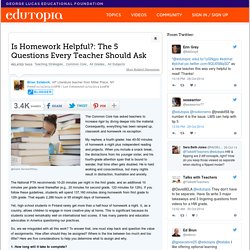

What Is Homework's Purpose in a Pandemic? What’s the Right Amount of Homework? Many teachers and parents believe that homework helps students build study skills and review concepts learned in class. Others see homework as disruptive and unnecessary, leading to burnout and turning kids off to school. Decades of research show that the issue is more nuanced and complex than most people think: Homework is beneficial, but only to a degree. Students in high school gain the most, while younger kids benefit much less. The National PTA and the National Education Association support the “10-minute homework guideline”—a nightly 10 minutes of homework per grade level. But many teachers and parents are quick to point out that what matters is the quality of the homework assigned and how well it meets students’ needs, not the amount of time spent on it. The guideline doesn’t account for students who may need to spend more—or less—time on assignments.
Small Benefits for Elementary Students Moderate Benefits for Middle School Students How long will it take to complete? Freeing Students—and Teachers—From Homework. I stopped assigning homework to my second-grade students last year, and something surprising happened: They started doing more work at home.

This inspiring group of 8-year-olds used their newfound free time to explore subjects and topics of interest to them. Even better, they excitedly reported their findings to their peers—who then became inspired enough to explore their own areas of interest. I wish I could say that this was part of my master plan and that I’m just that good, but my students get all the credit for this one. These are just a handful of examples of the in-depth learning that occurred at home once my students were given the gift of time: Student 1: After learning about weather patterns during our science unit, she decided to learn more about the effects of Hurricane Sandy on our local community. Student 3: After learning about the Civil War, he made a 3D model of the Battle of Gettysburg and a trifold display with key figures, a timeline, and interesting facts. 1. 2. 3. What Would Happen If Students Assigned Their Own Math Homework? Is homework worthwhile?

Does doing it make a difference in learning? These questions are the source of much debate nowadays. The Risks of Guesstimating Homework Time. It is often said that a sign of insanity is doing something over and over again and expecting different results each time. This sums up how most American schools are dealing with the homework issue. Not only does homework impact students but it also impacts their families.
It is common for students and families to feel that they don’t have the time it takes to maintain a healthy balance between work and the rest of their lives. Family time that could be spent getting outdoors, visiting friends and relatives, and relaxing is being unnecessarily burdened by the large amount of homework kids have to do. One student’s homework has the power to reshape how the entire family spends its time and sets its schedules. Guesstimating Pitfalls Despite studies -- such as this one from Stanford -- that show homework is ineffective beyond a certain amount per night, teachers and administrators continue to assign too much homework.
[4400] How We Can Fix the Biggest Problem Created by Homework. Is Homework Helpful?: The 5 Questions Every Teacher Should Ask. Posted 10/13/2014 5:16PM | Last Commented 12/02/2014 4:29PM @Gable Denims/500px The Common Core has asked teachers to increase rigor by diving deeper into the material.

Consequently, everything has been ramped up, classwork and homework no exception. My nephew, a fourth grader, has 40-50 minutes of homework a night plus independent reading and projects. When you include a snack break, the distractions from his younger sister, and his fourth-grade attention span that is bound to wander, that time often gets doubled. The National PTA recommends 10-20 minutes per night in the first grade, and an additional 10 minutes per grade level thereafter (e.g., 20 minutes for second grade, 120 minutes for 12th). Yet, high school students in Finland rarely get more than a half-hour of homework a night. So, are we misguided with all this work? 1. There are no surefire guidelines or golden rules that say how long students should work, especially since they progress at different speeds. 2. 3. 4. 5.